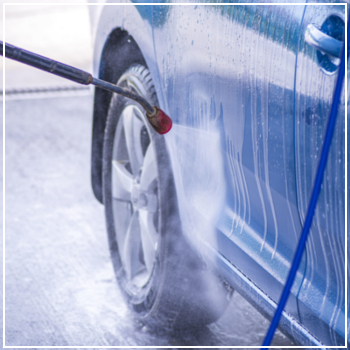However, while pressure washing might seem like a great idea, it’s important to understand its limitations and risks. Improper use can lead to serious damage, including paint chipping, exposure of the underlying metal, and even rust formation. If you're thinking about tackling this project yourself, there are some key considerations you need to keep in mind. Contrary to popular belief, pressure washing isn’t just about turning on the hose and blasting away. Modern pressure washers come in both electric and gas-powered models, each offering different levels of performance. The PSI (pounds per square inch) and GPM (gallons per minute) settings play crucial roles in ensuring you don't inadvertently damage your car. A typical car requires a PSI between 1,200 and 1,900 and a GPM around 1.4 to 1.6, providing roughly 1,900 to 2,800 cleaning units. Any higher than this can severely compromise your car’s finish. When selecting a pressure washer, always opt for an electric model. Gas-powered units are generally more powerful, but they can easily surpass safe limits, potentially damaging your car’s glass or paint. Additionally, the angle of the nozzle matters significantly. Nozzles range from 0 to 65 degrees, with narrower angles delivering more concentrated streams. For car washing, it’s best to stick to nozzles with an angle of 15 degrees or wider, which are gentler on the surface. Avoid anything below 15 degrees, as it can be far too harsh for your car's paint. Make sure to park your car in a safe, open space before beginning the process. This ensures that the high-pressure stream doesn’t damage surrounding objects like fences, pavement, or landscaping. It’s also crucial to ensure that all doors, windows, and the trunk are closed to prevent water from seeping into sensitive areas. Start by thoroughly rinsing off loose dirt and debris from the car’s surface before applying any detergent. This step is vital to avoid scratching the paint during the washing process. Despite its reputation for efficiency, pressure washing your car can go horribly wrong if not done correctly. According to Consumer Reports, improper use can strip away the protective coating of your car, leaving it vulnerable to rust and corrosion. The forceful spray can also push small rocks and dirt particles against the surface, causing further abrasion. One of the most common mistakes made by car owners is failing to pre-clean the car before pressure washing. Dirt left on the surface can act like sandpaper when combined with the high-pressure stream, leading to scratches across the paintwork. Another issue arises when the paint is already damaged; the pressure washer can worsen existing chips or cause large sections of paint to peel off entirely. Age is another factor to consider. Older cars, particularly classic models, are more prone to rust and should be handled with extra care. Some car owners also misuse certain parts of the pressure washer, such as applying it directly to the engine bay or plastic components, which can result in irreparable harm. Additionally, using dish soap or laundry detergent instead of automotive-specific cleaners can cause further damage since these products lack the proper pH balance needed for car surfaces. If you're unsure about your ability to handle the task safely, it’s always better to seek professional help. At DaSilva’s Auto Body, we specialize in exterior detailing and rust removal services designed to restore your car to its former glory. Don’t risk costly repairs—contact us today to schedule an appointment at our Naugatuck location. Iron Front Control Arms,Customized Swing Arm,Rear Control Arm Assembly,Front Control Arm Swing Arms Ningbo Yongxin Auto Parts Co., Ltd. , https://www.yongxinautoparts.com There’s a common misconception among DIY car enthusiasts that pressure washing is the ultimate solution for removing dirt and restoring your car's shine. Many claim it’s faster and more efficient than traditional hand-washing and waxing. With the rise of convenience-focused lifestyles, pressure washing at home has become increasingly appealing, especially during times when we're all trying to minimize external interactions.
There’s a common misconception among DIY car enthusiasts that pressure washing is the ultimate solution for removing dirt and restoring your car's shine. Many claim it’s faster and more efficient than traditional hand-washing and waxing. With the rise of convenience-focused lifestyles, pressure washing at home has become increasingly appealing, especially during times when we're all trying to minimize external interactions.Mastering the Art of Pressure Washing
Potential Pitfalls to Watch Out For